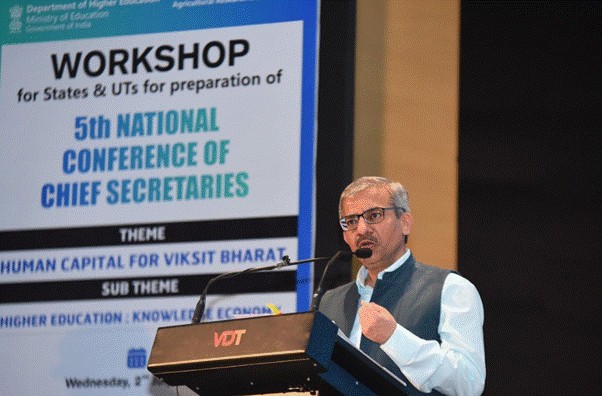In the run-up to the 5th National Conference of Chief Secretaries, the Department of Higher Education on Wednesday organised a national workshop with states and Union Territories on the theme ‘Higher Education: Knowledge Economy’.
The day-long session, held at the Pragyan Auditorium of the AICTE in New Delhi, brought together senior officials and experts to discuss how higher education can help build a skilled and future-ready workforce for Viksit Bharat.
The workshop, held in collaboration with the Department of Agricultural Research and Education (DARE), is part of a series of preparatory meetings ahead of the Chief Secretaries’ Conference, which will be held later this year under the broader theme ‘Human Capital for Viksit Bharat’. A concept note outlining the sub-theme had been shared with all states and UTs in advance to align local perspectives with national goals.
Speaking at the event, Dr Vineet Joshi, Secretary, Department of Higher Education, said states and UTs have a vital role in shaping India’s education sector and driving the country’s development. “If states improve, Bharat improves,” he said, urging states to make better use of existing schemes, adapt policies to local needs, and involve communities beyond state capitals. He described the concept note as a starting point for states to design transformative changes.
Dr Mangi Lal Jat, Secretary, DARE, called for modernising agricultural education by adopting new technologies such as artificial intelligence, machine learning and behavioural sciences. He also highlighted the need for collaboration between agricultural universities, IITs and other institutions to help students tackle challenges in the agriculture value chain.
Former UGC Chairman Prof M Jagadesh Kumar spoke about the National Education Policy 2020 and its aim to break down rigid academic barriers and promote interdisciplinary learning. He said the focus should be on nurturing curiosity and adaptability among students and pointed to frameworks such as the National Credit Framework and National Higher Education Qualification Framework as tools for driving innovation.
AICTE Chairman Prof T G Sitharam stressed the need for India to move from a service-based economy to a product-driven one by integrating robotics, artificial intelligence and other advanced technologies into technical education. He mentioned initiatives like the Smart India Hackathon, the AICTE Internship Portal and the E-Kumbh Portal, which provides free textbooks in various Indian languages.
States also shared their experiences and local plans. Officials from Maharashtra spoke about developing EduCity in Navi Mumbai and setting up offshore campuses to make the state a global education hub. Universities discussed including Indian Knowledge Systems in mainstream curricula to preserve traditional knowledge alongside modern learning.
Some states highlighted the need to address brain drain by encouraging Indian scholars abroad to return and contribute to domestic institutions through research collaborations and sabbaticals. Others underlined the need to close faculty gaps and improve infrastructure so that state public universities can match the standards of national institutions. Karnataka officials showcased initiatives such as Nipuna Karnataka and digital learning tools to equip students with industry-ready skills.
States and UTs have been asked to gather inputs from officers, including those working at the grassroots level, and submit detailed feedback notes by August 20, 2025. State-specific reports are expected by August 31. These submissions will help prepare the background material for the Chief Secretaries’ Conference and guide future discussions on strengthening higher education as a key part of India’s knowledge economy.














